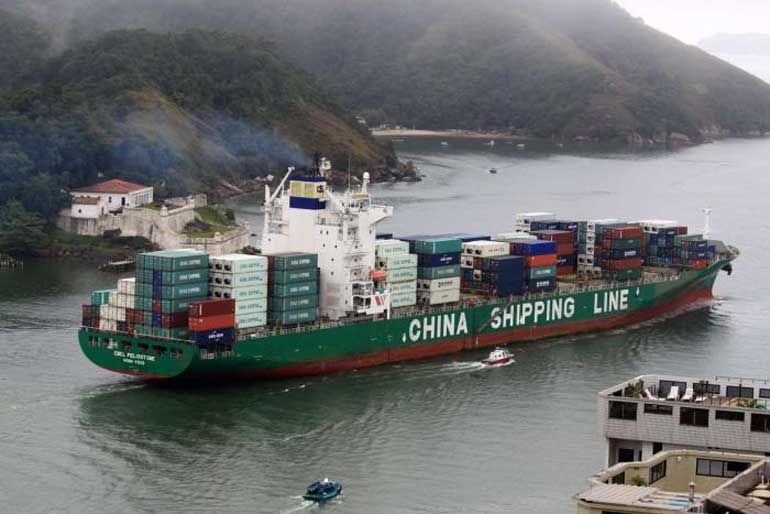Thursday Feb 19, 2026
Thursday Feb 19, 2026
Monday, 31 August 2015 00:00 - - {{hitsCtrl.values.hits}}

China Cosco’s Ma Zehua (left) and Jiang Lijun face the press in a video conference on the company’s results – Photo: Dickson Lee
HONG KONG: Trading in shares of the Hong Kong and Shanghai-listed subsidiaries of China’s two largest shipping lines, Cosco and China Shipping, will remain suspended for another week closed-door talks on what is believed to be merger discussions continue.
China Cosco Holdings, China Shipping Container Lines, Cosco Pacific, bulk line China Shipping Development, and China Shipping Technology Network all filed notices to the exchanges indicating the trading suspension would continue and be reviewed on Sept. 8. Being suspended has enabled the carriers to miss the recent stock market rout in China that has cost companies billions in falling share value.
Chinese executives of the carriers have been tight lipped on the discussions, but it is widely believed that the lines are thrashing out ways to merge the container and bulk shipping divisions.
Barclays Research said in a note to customers that a shipping consolidation fits with the bigger picture of increasing state-owned entity reform in China. The State-owned Assets Supervision and Administration Commission of the State Council said in December last year it planned to reform state-owned enterprises in seven key industries, including shipping.
“The potential shipping merger increases the likelihood of shipping SOEs to be included in the second batch of SOE reform candidates,” the research note stated.
The last substantial SOE merger was between China South Railway and China North Railway and it was completed in six months ending in May. However, Barclays said a potential Cosco-China Shipping merger would be more complex than the CSR-CNR tie-up given the intricate web of intra-group shipping entities. The eight listed entities under the two shipping groups have total assets of $76 billion, compared with $47 billion for CSR and CNR combined.
A merger between Cosco Container Lines and CSCL would create the world’s fourth-largest single carrier, controlling a good 8% of global container shipping capacity. The new entity would be solid on the Asia-Europe trades but would have less share of the market on the other trades.
China’s media has reported that Beijing wants a formal roadmap for a merger within three months of the decision being made. There is no way to confirm that but the world is watching closely.
Drewry pointed out recently that a merger between Cosco and CSCL made sense for China, but the ramifications for the container shipping industry could be far-reaching, particularly among the alliances.
Cosco is a long-standing member of the CKYHE Alliance alongside “K” Line (Japan), Yang Ming (Taiwan), Hanjin (South Korea) and Evergreen (Taiwan); while CSCL is a part of the Ocean Three Alliance alongside CMA CGM (France) and UASC (Qatar) that was set-up at the start of this year. (Source: Journal of Commerce)

China’s shipping giants face strong headwinds from fleet oversupply and sluggish global demand, after reporting a weak performance for the first half.
China Cosco Holdings, the country’s biggest shipping company, reported a 7.9% year-on-year decline in revenue to 29.93 billion yuan.
Helped by four billion yuan in government subsidies on scrapping old vessels, the company made a net profit of 1.9 billion yuan, swinging from a loss of 2.28 billion yuan a year ago.
China Shipping Container Lines, the second-largest shipping firm, posted a 97.5% plunge in net profit to 10.64 million yuan.
Container and dry bulk freight rates dropped sharply in the first six months, with the Baltic Dry Index down 47% year on year at an average 623 points, the lowest level since the global financial crisis.
“We expect the price to stay low as global overcapacity will persist due to weakness in the euro zone and emerging economies,” said Ma Zehua, China Cosco’s chairman.
“The slowdown in China plus the fact that we will not receive any government subsidies in the second half means we will face a lot of pressure,” chief financial officer Tang Runjiang added.
To support the industry, Beijing has been granting 1,500 yuan per gross tonne to shipping companies to replace obsolete ships. The award is settled in the first half of every year.
“With the massive influx of new shipping capacity, the shipping market will face even more uncertainties,” CSCL said.
China Cosco projects the Baltic index to rebound to 1,100 points, but analysts think it is “too positive”.
“The index will be below 1,000 points,” said Daniel Meng, an investment analyst at CLSA. “The dry bulk sector needs two years to pick up while the containers sector may recover a bit next year. The shipping market as a whole will still have a tough time in the short term.”
According to Clarkson, global container and dry bulk shipping this year will see capacity growth of 6.5 and 2%, respectively, exceeding demand growth.
To cope with the headwinds, China’s shipping leaders are making efforts to cut costs and optimise fleets.
China Cosco’s director Jiang Lijun said the company would focus on integration strategies for the container and dry bulk sectors to improve efficiency.
The market expects a possible merger between the mainland’s two largest shipping and logistics conglomerates, China Ocean Shipping Group (Cosco) and China Shipping Group.
China Cosco, the flagship of state-owned Cosco, on Friday declined to comment on the merger plan. (Source: www.scmp.com)